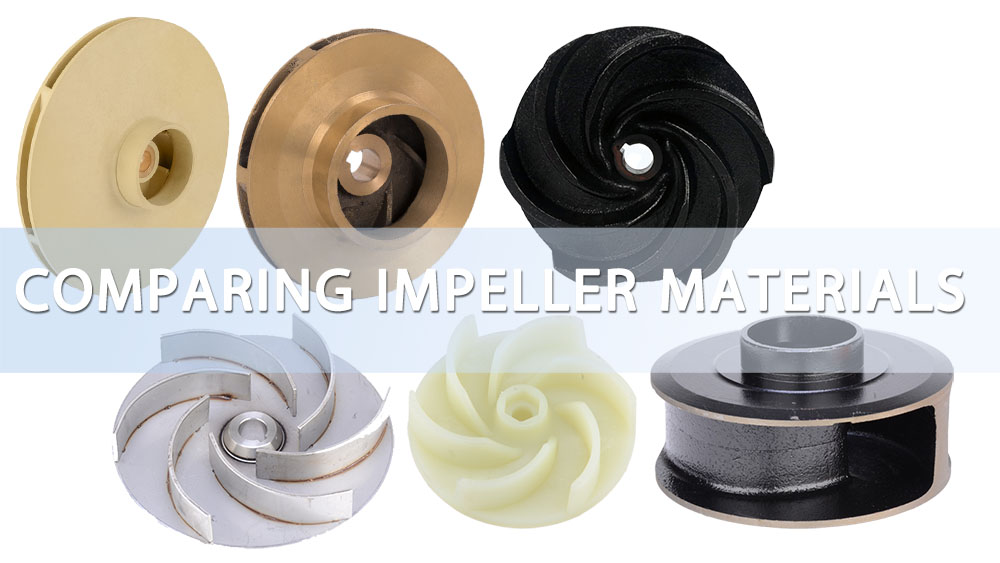+86 13816508465
Jul. 24, 2025

Choosing the right impeller material for a pump is more than just a technical decision—it directly impacts the pump's performance, longevity, and efficiency. Impellers are a crucial component in pumps, driving the movement of water and other fluids through their systems. Therefore, selecting the appropriate material is essential for procurement managers, distributors, rental service providers, and OEM partners looking to ensure maximum value and reliability in their operations.
This article explores the characteristics, advantages, and limitations of three commonly used impeller materials—brass, stainless steel, and engineering plastics. By the end, you'll have actionable insights into matching impellers to pump type and application, helping you make informed decisions in pump procurement and maintenance.
The choice of impeller material can make a significant difference in performance and durability, particularly in challenging operating conditions. Factors such as corrosion resistance, cost, operating environment, and the type of fluid being pumped all play a role.
For example, a pump handling seawater in industrial applications requires an impeller resistant to salt corrosion, whereas a standard household sump pump might prioritize cost-effectiveness over durability. Selecting the wrong material can result in frequent breakdowns, costly repairs, and unhappy customers.
Hook
【The right impeller material isn't just about price—it's about matching performance to purpose.】
1. Brass Impellers
Properties and Characteristics
Brass impellers are popular for their balance of durability and moderate corrosion resistance. They perform well in clean water and mildly corrosive environments, making them suitable for residential and light commercial applications.
Advantages
Brass offers excellent mechanical strength, making it durable under moderate operational loads.
Its density provides good inertia, stabilizing the pump's performance.
Brass resists wear and tear better than some plastics in water-based applications.
Limitations
Vulnerable to dezincification when exposed to aggressive fluids, which weakens its structural integrity.
Not ideal for highly acidic or saline environments.
Best Applications
Brass impellers are commonly found in household water supply systems and small-scale irrigation pumps.
2. Stainless Steel Impellers
Properties and Characteristics
Stainless steel impellers are known for their superior corrosion and abrasion resistance. They are ideal for industrial and demanding applications, particularly where aggressive media like saltwater or chemicals are involved.
Advantages
Stainless steel withstands exposure to harsh substances, making it highly versatile for aggressive environments.
Long service life reduces the need for frequent replacements.
High mechanical strength ensures reliable performance even in high-pressure or high-load applications.
Limitations
Higher cost compared to brass or plastic impellers.
Heavier weight, which might increase energy demands for smaller pumps.
Best Applications
Stainless steel impellers are widely used in industrial wastewater management, chemical handling, marine applications, and other scenarios requiring maximum durability.
3. Engineering Plastics Impellers
Properties and Characteristics
Engineering plastics, such as PPO, PA66, Noryl, or reinforced composites, are often chosen for lightweight and cost-effective pump applications. These impellers are corrosion-resistant but less robust under high stresses.
Advantages
Lightweight design simplifies pump operation and reduces motor stress.
Excellent corrosion resistance, ideal for residential clean water systems.
Cost-efficient, making them a practical choice for price-sensitive applications.
Limitations
Limited resistance to high temperatures and abrasive materials, reducing their suitability for rugged industrial environments.
Not as durable over time compared to metal alternatives.
Best Applications
Plastic impellers are commonly used in domestic sump pumps, garden pumps, and pool circulation systems where high pressures and aggressive fluids are not present.
A. Submersible Pumps
Submersible pumps often operate underwater or in fluid-filled environments, exposing impellers to debris and corrosive agents.
Plastic Impellers: Economical and efficient for residential and low-stress applications.
Brass Impellers: Suitable for mid-range utility and drainage pumps.
Stainless Steel Impellers: Essential for pumps dealing with industrial wastewater, seawater, or highly abrasive materials.
B. Centrifugal Pumps (Surface Type)
These pumps rely on impellers to ensure consistent performance and pressure.
Plastic Impellers: Ideal for garden irrigation or swimming pool systems with clean water.
Brass Impellers: Used in moderate-pressure water circulation and household applications.
Stainless Steel Impellers: Preferred in food processing, marine operations, and chemical industries requiring reliable, high-pressure performance.
C. Single-Stage vs. Multistage Pumps
Single-Stage Pumps
Plastic impellers suit basic water transfer or light irrigation.
Brass or stainless steel impellers should be used when dealing with higher flow or pressure in moderate conditions.
Multistage Pumps
Require more durable impellers due to high operational demands.
Stainless steel is the standard for industrial and agricultural use.
Brass and reinforced plastic may be considered in compact booster systems or residential setups.
The table below summarizes the best impeller material for various applications:
Application | Recommended Material |
Domestic clean water (low head) | Engineering Plastics |
Light commercial irrigation | Brass or Plastic |
Industrial wastewater or slurry | Stainless Steel |
Seawater or chemical handling | Stainless Steel (316/duplex) |
Booster pump for building supply | Brass or Stainless Steel |
Garden & pool circulation | Plastic |
Procurement Tip
Opting for premium materials like stainless steel may involve higher upfront costs, but the investment can reduce maintenance and failure rates in challenging environments.
When selecting an impeller material, balancing cost and performance is key:
Long-Term ROI: Stainless steel justifies its higher cost with superior durability in harsh environments.
Good Enough for Basic Needs: Plastic impellers work well for cost-effective residential or light commercial applications.
Middle Ground: Brass offers a compromise between durability and affordability but may require more attention to water chemistry.
The choice of impeller material has a direct impact on pump performance, efficiency, and lifespan. Understanding the unique strengths and weaknesses of brass, stainless steel, and engineering plastics allows procurement teams, distributors, and service providers to select options that align with specific pump types and operating conditions.
Whether you're sourcing pumps for industrial wastewater, residential irrigation systems, or marine applications, ensuring the right impeller material is crucial for reliable and efficient performance.
Address
No.17 XeDa Jimei Ind. Park, Xiqing Economic Development Area, Tianjin, China
Telephone
+86 13816508465
QUICK LINKS